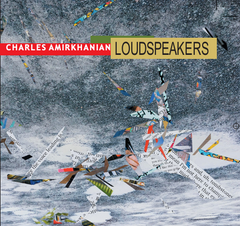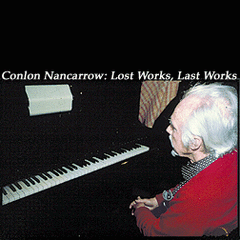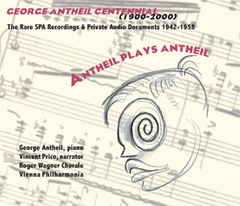OTHER MINDS WEBSTORE
Charles Amirkhanian: Lexical Music [OM-1023-2]
When Charles Amirkhanian’s Lexical Music was released on pioneering Bay Area record label 1750 Arch Records in 1980, it was heralded as a masterpiece of the then-nascent text-sound poetry scene. The New York Times called Amirkhanian “expert at the sort of things his imitators do not do half so well as he.” Lexical Music is a sort of high water mark for American text-sound poetry, an album with many imitators but few equals. It sounds like nothing before or since. The style developed in electronic music studios across Europe, primarily in Scandinavia, but was slow to develop similarly in the United States. The Bay Area proved to be fertile ground for the movement, due in part to Amirkhanian’s work and support through his position as Music Director at Berkeley’s KPFA-FM Radio.
Amirkhanian himself is the primary performer throughout Lexical Music. His background as a percussionist combined with his radio voice make him the ideal candidate to execute the spoken word scores. Single words lose their meaning through repetition. Nonsense phrases build into intricate hypnotic grooves. The wavering line between intelligible text and pure sound weaves through the entire record. The pieces combine the topography of William S. Burroughs’ audio cut-ups with the psychic space of the early tape loop experiments of Amirkhanian’s peers Steve Reich, Terry Riley, and Pauline Oliveros. Amirkhanian’s dry wit occasionally shines through, an absurdist touchpoint in a field of mostly dour experimentalists. Jesting aside, Lexical Music investigates the nature of language and how our verbal comprehension is altered in the face of repetition, density, and acoustic space, both real and imagined.
01) Mugic (1973) 5:28
02) Seatbelt Seatbelt (1973) 14:50
03) Dutiful Ducks (1977) 2:02
04) Muchrooms (1974) 4:58
05) Mahogany Ballpark (1976) 9:35
06) She She and She (1974) 8:27
![Charles Amirkhanian: Lexical Music [OM-1023-2]](http://webstore.otherminds.org/cdn/shop/products/LexMusic_digital_cover_FINAL_large.jpg?v=1571264335)
![Charles Amirkhanian: Lexical Music [OM-1023-2]](http://webstore.otherminds.org/cdn/shop/products/LexMusic_digital_cover_FINAL_thumb.jpg?v=1571264335)
![Composer-Critics of the New York Herald Tribune [OM-1024-2]](http://webstore.otherminds.org/cdn/shop/products/OM_1024_Digital_Cover_medium.jpg?v=1571264335)


